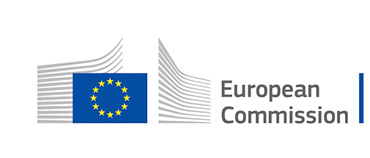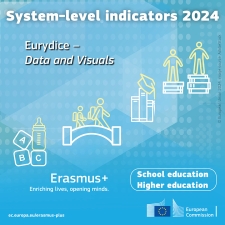|
|
|
|
|
|
|
|
|
|
Welcome
|

|
Welcome to Eurydice Voice!
|
|
Welcome to the winter edition of Eurydice Voice, our quarterly newsletter.
This year, we celebrate 45 years of the Eurydice Network, a cornerstone of education cooperation in Europe. Since 1980, Eurydice has been at the forefront of providing reliable, comparable, and insightful data to support education policies across the continent. As we mark this milestone, we reflect on our achievements, welcome new members, and look ahead to the future. Watch our special anniversary video highlighting Eurydice’s journey and read our article on the expansion of our Network.
In this edition we also highlight the policy area of early childhood education and care (ECEC). The new edition of Key Data on ECEC in Europe (2025) provides an in-depth analysis of policy trends, progress made, and challenges that remain. Download the full report to understand how ECEC is evolving across Europe! You will also find our latest infographic, a brand new Focus on Article and the usual country updates from our National Units.
This year, we are also celebrating 10 years of the Youth Wiki Network and to mark this occasion we are happy to showcase our new interactive maps. They explore the legal framework of youth work across Europe, professionalisation and career pathways for youth workers, mobility opportunities under Erasmus+ and the European Solidarity Corps.
Last but not least, have a look at our “Education news” section, that features the current 2025 Erasmus+ call for proposals, the twentieth anniversary of the eTwinning project, an online platform that helped a generation of teachers to build enduring cross-border connections and collaborative projects, as well as the launching of the European Higher Education Sector Scoreboard, a new tool that transforms how we monitor and compare higher education systems across Europe. This is a key feature of the brand new European Higher Education Sector Observatory (EHESO).
|
|
|
|
|

|
|
|
|
|
Happy birthday to the Eurydice Network!
|

|
Happy birthday Eurydice! Let's celebrate the 45 years of our Network!
|
|
Eurydice turns 45! Since 1980, the Eurydice Network has been a key source of reliable and comparable information on education in Europe. For over four decades, we have provided policymakers, researchers, and education professionals with in-depth analyses and data to support evidence-based decision-making.
To mark this milestone, we are happy to share a special anniversary video celebrating our journey, from the past to the present, which has shaped the Network over the years.
Watch the video now!
|
|
|
|
|

|
|

|

|
Live talk: Eurydice and the history of European Cooperation on Education
|
|
Watch the live panel we had a few years ago with Luce Pepin, author of the book “The History of European cooperation in education and training: Europe in the making - an example”.
You will listen to interesting insights about the importance of cooperation between States, on the European Education Area, on the Erasmus+ programme and much more. You'll discover how and why the Eurydice Network has played a key role in fostering strong cooperation across the European education landscape.
|
|
|
|
|

|
|

|

|
Building Bridges: Eurydice Network’s Enlargement
|
|
The Eurydice Network has undergone a significant expansion last year. With the inclusion of National Units from Georgia, Moldova, and Ukraine, the network is evolving into a more encompassing platform for educational exchange and cooperation. The expansion of the Eurydice network signifies a collective commitment to building a more robust, inclusive, and innovative educational landscape. It underlines the opening of new avenues for cross-border cooperation and the development of joint educational initiatives.
|
|
|
|
|

|
|

|

|
Throwback time: "20 years promoting better understanding of education systems"
|
|
Have a look at the report "Eurydice, the information Network of education in Europe" that was published to celebrate our 20th anniversary!
Opened by the iconic sentence of Jacques Delors:
"It is precisely the creative opposition between the diversity of national systems and the growing similarity of our problems that provides one of the main raisons d’être of European cooperation", the book highlights the role played by the Eurydice Network in understanding and explaining education policies in Europe while fully acknowledging their differences.
|
|
|
|
|

|
|
|
|
|
Celebrating the 10 years of the Youth Wiki Network: recent milestones & achievements
|
|
|
|
|
Early Childhood Education and Care on the spotlight
|

|
Key data on early childhood education and care in Europe - 2025
|
|
The third edition of key data on early childhood education and care (ECEC) has been recently published, offering a comprehensive in-depth analysis of the state of ECEC across Europe. Produced by the Eurydice Network, the report provides a fresh and nuanced perspective on the ECEC landscape. It reviews policy changes over the past decade and introduces new indicators to reflect evolving priorities in the ECEC field.
These insights provide a clear picture of the current situation and major trends across Europe, as well as a deeper understanding of individual systems:
- Many European countries have made significant progress in expanding access to ECEC, particularly in the years before primary school.
- Yet, the right to education from a very early age on is still not universally guaranteed, and the quality of services varies widely within countries and across Europe.
- Staff shortages and the need for enhanced professional development and improved working conditions remain pressing challenges.
The report includes:
International comparisons, analysing ECEC systems across 37 European countries, highlighting the successes and challenges in striving for high quality.
National information sheets outlining the main aspects of each country’s ECEC system for easy reference.
Whether you're a policymaker, researcher, or simply passionate about ECEC, this report is a valuable resource that will help you navigate the complex landscape of early childhood education and care.
|
|
|
|
|

|
|

|

|
Early childhood education and care (ECEC)
|
|
Explore the five main aspects regarding the right to affordable ECEC of good quality for all children in Europe. These indicators reveal large variations between European countries regarding the public commitment to provide a place in ECEC, the requirements for staff and educational guidelines.
|
|
|
|
|

|
|

|

|
Our latest infographic
|
|
Discover key insights into early childhood education and care (ECEC) across Europe with our latest infographic! Explore our key findings on this fundamental policy area.
|
|
|
|
|

|
|

|

|
Focus On article: Our youngest - What future are we preparing them for?
|
|
“Children are the living messages we send to a time we will not see. “ John F. Kennedy”
It is a crisp January morning in Lyon, the streets are still and quiet as little Alix, bundled up in her winter coat is headed for her first day at the crèche. In Stockholm, Emil is repeating the numbers, “noll, en, två”, to his grandfather as they head to his förskola.
Markus, in Dresden, is looking forward to telling his Krippe playmates about the slope he braved on the sled yesterday, while in Valetta, Eliza is entering her vibrant nursery, giving her dad a quick hug before melting into the crowd of buzzing children.
Once the door closes behind them, the journeys these children embark on every day go far beyond play – they are engaging in activities that lay the essential groundwork for their future...
|
|
|
|
|

|
|
|
|
|
Country news on early childhood education and care
|
Ireland: New curriculum in early childhood education emphasises creativity and literacy
|
|
The Irish early childhood education framework, Aistear, has been updated for the first time since 2009. The revised framework, set to take effect in 2025, places greater emphasis on creativity, arts, literacy, numeracy, and STEM (science, technology, engineering and mathematics) education, while promoting the use of the Irish language.
|
|
|
|
|
|
|

|
Ukraine: Transforming the preschool education system
|
|
In implementing the state policy on preschool education in Ukraine, educational policymakers focus on creating a modern, high-quality, accessible, and inclusive learning environment that aligns with needs of children and society as a whole.
|
|
|
|
|
|
|
|
|
|
News
|

|
2025 Erasmus+ call for proposals still open!
|
|
The new Erasmus+ call for proposals comes with a budget of nearly €5 billion to support mobility and cooperation opportunities for learners, educators, and organisations.
The iconic programme continues growing in popularity, promoting inclusion, advancing the European Degree initiative, and supporting mobility and collaboration in Europe and beyond.
|
|
|
|
|

|
|

|

|
Celebrating 20 years of eTwinning: Connecting teachers, inspiring education
|
|
Over the past two decades, eTwinning has helped a generation of teachers to build enduring cross-border connections and collaborative projects. This year, we celebrate all together its 20 years!
|
|
|
|
|

|
|

|

|
The European Higher Education Sector Scoreboard is out!
|
|
The European Higher Education Sector Scoreboard (EHESS) is a groundbreaking new tool that transforms how we monitor and compare higher education systems across Europe. Building on the European strategy for universities (2022), EHESS showcases indicators aligned with EU policy objectives like skills development, cooperation in Europe and beyond, and EU values (academic freedom, gender equality, social inclusion). As a key feature of the European Higher Education Sector Observatory (EHESO), it offers thematic comparisons and detailed country pages, serving as a one-stop shop for insights into European higher education.
|
|
|
|
|

|
|

|

|
Take part in shaping the next EU long-term budget
|
|
Is the European budget fit for the future?
Have your say!
To support a free, democratic, secure, prosperous, and competitive Europe, the long-term budget must be simpler, more impactful, and more targeted. EU countries, businesses, and citizens need to rethink its structure to ensure it meets future challenges.
In order to reach together this goal, the European Commission is now inviting all Europeans to have their say on the next budget, and the policies it should support. A formal proposal will then be presented in July 2025.
A series of public consultations has just been launched they will remain open for the next 12 weeks. For example, you can start with the consultation dedicated to "EU funding for cross-border education, training and solidarity, youth, media, culture, and creative sectors, values, and civil society".
Have your say until May 7th, your voice matters!
|
|
|
|
|

|
|
|
|
|
Forthcoming publications
|

|
Eurydice Reports - Data and visuals
|
National Student Fee and Support Systems in European Higher Education - February 2025
Academic Staff - May 2025
Recommended annual instruction time in full-time compulsory education in Europe - June 2025
Entrepreneurship education - Autumn 2025
Policies to address underachievement in basic skills at school in Europe - Autumn 2025
Teachers' and school heads' salaries and allowances in Europe - Autumn 2025
|
|
|
|
|
Our latest publications
|

|
System-level indicators on education and training systems in Europe – 2024
|
|
These indicators provide valuable insights into four key topics: education policies on early childhood education and care, early school leaving, higher education, and equity in both school and higher education.
For the first time, the 2024 update of our system-level indicators takes the form of an interactive webtool, allowing users to easily navigate and visualise the collected data. With this user-friendly interface, you will gain a deeper understanding of education systems across Europe.
These indicators serve as an essential data source for the European Commission's annual Education and Training Monitor, which offers an in-depth analysis of the development of education and training systems across the European Union, offering valuable insights into their development.
|
|
|
|
|

|
|

|

|
The structure of European education systems - 2024/2025
|
|
What are the different models of primary and secondary education systems and how long does each education level last? How diverse are the programmes offered at different education levels? How closely do higher education programmes follow the Bologna degree structure? Find the answers to these questions in Eurydice's latest data and visuals: ‘The structure of the European education systems’, which is for the first time available online in an interactive format.
Explore the variety of approaches to structuring education across Europe with this new web tool. While these systems can be multi-layered and complex, Eurydice’s project will assist you in navigating this landscape through comparable visualisations. The data and visuals depict the structure of education and training systems from early childhood education and care to higher education level, for the 2024/2025 school/academic year. The information encompasses 39 European educational systems of 37 countries participating in the Erasmus+ programme.
|
|
|
|
|

|
|

|

|
The organisation of the academic year in Europe – 2024/2025
|
|
The interactive academic calendar interactive web tool provides valuable insights into how the academic year is structured, including the start date and the decision-making level responsible for these timelines, as well as the organisation of the year into semesters or other formats. The information is available for 37 countries.
|
|
|
|
|

|
|

|

|
School calendars in Europe – 2024/2025
|
|
How is the school year organised across Europe? Despite some differences, countries show many similarities regarding the structure of their school calendars in primary and general secondary education. In most education systems, the 2025 summer holidays will start in June. But the length of the break varies significantly: from 6 weeks or less in Denmark, the Netherlands, Liechtenstein, and some Swiss cantons, to as much as 14 weeks in some regions of Italy. This year for the first time, Eurydice is releasing the school calendars as an interactive web-tool, providing all dates for school holidays at national level and by region or zone.
It provides information on the start of the school year, as well as the timing and length of school holidays.
|
|
|
|
|

|
|
|
|
|
Who we are
|
|
|
Please do not reply to this message, as it is coming from an unmonitored email address.
You are receiving this newsletter because you are subscribed to the Eurydice mailing list.
To subscribe, please click on this link
To manage your subscription, please click on this link
|
The European Commission is committed to personal data protection. Any personal data is processed in line with the Regulation (EU) 2018/1725. Please read the privacy statement.
|
|
Catalogue Number: EC-01-25-049-EN-Q
|
|
 |
|



























